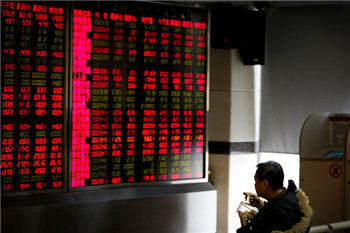
If you look only at the global economy, and what leading forecasters think it will do in 2016, things look to be in a reasonably solid state. The world economy will grow 3.4 percent this year, economists at the International Monetary Fund projected this week, up from 3.1 percent in 2015. Private sector forecasters mostly have similar expectations.
如果你只着眼于全球经济,着眼于专家对2016年全球经济走势的预测,那么形势显得相当稳健。本周,国际货币基金组织(IMF)的经济学家预计,世界经济今年将增长3.4%,较2015年的3.1%有所提高。私营部门的专家也有类似的预期。
If you look only at global financial markets, it’s Aaack, Run for the Hills! The Sky is Falling!
但如果你只看全球金融市场,就会有一种“啊啊啊,快逃啊!天要塌下来了!”的感觉。
That is to say, global stock, bond and especially commodity markets have, in the first three weeks of the year, swung in ways that suggest this is a perilous time. Their volatility and direction are consistent with the prospect of a new crisis or global recession. (The Standard & Poor’s stock index closed down 1.2 percent Wednesday after dropping more than 3 percent earlier in the day.)
换句话说,从全球股市、债市,尤其是大宗商品市场今年头三个星期的走势来看,现在是一个危险的时刻。这些市场的波动幅度和走向,显示可能会出现一场新的危机,或者是全球经济衰退。(标准普尔股票指数本周三收盘下跌1.2%,当天早些时候跌幅超过3%。)
The price of oil is where most of the action is, with West Texas Intermediate Crude trading below $27 a barrel Wednesday, down from around $37 at the end of December, $60 in June and $100 in mid-2014. The broad S.&P. is down 9 percent so far in 2016, and stock indexes in many emerging economies are down even more. Bond and currency markets point to economic troubles in oil-producing nations. (Considering a trip to Quebec? Good move. The Canadian dollar is down 19 percent against the United States dollar since May).
油价在其中出演了重头戏,本周三,西德克萨斯中质原油价格跌至每桶不到27美元。这个价格在2014年年中是100美元,去年6月是60美元,12月底大约37美元。涵盖行业广泛的标普指数自2016年开年以来下跌了9%,而在很多新兴经济体,股指的下挫幅度还要更大一些。债券和外汇市场显示,石油出产国遇到了经济问题。(想去魁北克旅游?明智之举。去年5月以来,加元兑美元汇率下跌了19%。)
What makes these falling prices unnerving is that it’s hard to tell a simple story about what is driving them. It could be that the markets are moving according to their own internal logic, driven by money managers’ psychology, with their habitual toggle between fear and greed turning back toward the former. More frightening: The markets could be pricing in some darker facts about the outlook for the world that economists don’t fully understand.
价格这样下跌之所以令人不安,是因为很难找到它们背后的直接推动因素。这可能是因为市场正按照自己的内在逻辑变化,由基金经理的心态所推动——他们的心理习惯性地在恐惧和贪婪之间切换,现在则一头偏向了恐惧。更可怕的是:市场决定的价格,可能反映了一些关于全球展望的更阴暗的因素,而经济学家对这些状况的理解并不彻底。
In the past, when signals were so negative, there usually was a clearer story to tell.
在过去,当市场信号变得如此消极的时候,人们通常会找到比较清晰的原因。
In the summer and fall of 2011, markets were tumbling on fears that the union using the euro currency would dissolve; in 2008, it was fears that the global financial system would collapse; in 2000 it was on the realization that stock prices, especially for tech companies, had gotten out of line.
2011夏秋出现股市暴跌,是因为市场担心使用欧元的联盟会瓦解;2008年是因为担心全球金融体系会崩溃;2000年是因为意识到股票价格高得离谱,特别是科技公司的股价。
The recent market swings are “puzzling,” writes Olivier Blanchard, until recently the chief economist of the International Monetary Fund and now a senior fellow at the Peterson Institute for International Economics. As a general rule, if Mr. Blanchard is puzzled about something involving global economics, you probably should be, too.
近期的市场波动“令人费解”,奥利维尔·布兰查德(Olivier Blanchard)说。他是不久前卸任的IMF首席经济学家,目前在彼得森国际经济研究所(Peterson Institute for International Economics)担任高级研究员。一般来说,如果布兰查德对全球经济中的某些东西感到费解,那么你应该也很费解才对。
China’s once-blockbuster economic growth does seem to have slowed a good deal, though it’s not clear why that should have enormous effects outside China. And the drop in the highly volatile and speculative Chinese stock market is more significant than is reflected by most evidence of what is happening on the ground in the Chinese economy; for example, private surveys of business activity point to only a slight contraction.
中国的经济增长曾经令人惊叹,目前似乎大大放缓,但还不清楚为什么会给中国以外的地方带来巨大影响。中国股市极不稳定,极具投机性质,但从大多数反映中国经济基本面的证据来看,它的跌幅不应该这么大。举个例子,私营部门的调查显示,中国的商业活动只出现了轻微的收缩。
Oil prices are down so much that profits of oil companies will suffer mightily, and some will surely go bankrupt. They have already been cutting way back on investment in oil exploration. But traditionally, that has been counterbalanced by celebrations from industrial and transportation companies and from ordinary people over lower bills for gasoline and other forms of fuel.
油价跌到这种程度,石油公司的利润将会严重受损,有些公司必然会破产。它们已经削减了在石油勘探上的投资。不过从以往的情况来看,工业和运输企业,乃至普通民众从汽油和其他燃料价格的下降中获得的利益,可以抵销这种损失。
There’s a more complex story in which global banks are sitting on loans for oil exploration that will go bad, creating losses in the financial sector that could cause a pullback in lending more broadly, a risk described by researchers at the Bank for International Settlements in 2015. In this scenario, loans for oil exploration could be what subprime mortgages were in 2007 — a trigger that reveals bigger problems in the financial system.
这背后的问题更加复杂:全球银行业为石油勘探发放了很多贷款,如今这些贷款的前景不妙,这会导致金融业受损,进而会引发更加广泛的贷款收缩。国际清算银行(Bank for International Settlements)的研究人员2015年时曾阐述过这样的情况。在这种形势下,石油勘探贷款可能就像是2007年时的次级按揭贷款那样,仿佛是一个触发器,将金融体系中更重大的问题暴露出来。
One piece of evidence for this theory: Bank stocks have fallen even more in 2016 than the stock market over all, implying that investors believe banks did a little too much oil-field lending, though certainly this won’t amount to the kinds of declines and major troubles of 2008.
这个推断的证据之一是:2016年,银行类个股的跌幅大于总体股市,这可能意味着投资者认为银行为油田提供的贷款太多了一点。不过可以肯定,当前的局面不能和2008年那样的暴跌和大麻烦相提并论。
Another possibility is that this sell-off reflects the unwinding of “herd” behavior among global asset managers, who piled into similar investments during the 2009 to 2014 stock market rally and are now racing to unload the same high-yield bonds, emerging market stocks and energy investments all at once. In this telling, the moves in market prices reflect more the psychology of money managers than fundamental information about the state of the global economy.
另一种可能性是,这种抛售反映了全球资产管理者“羊群效应”的循环。他们在2009年至2014年股市上涨期间纷纷涌入相同的投资领域,而现在却突然争相减持同样的那些资产,如高收益债券、新兴市场股票及能源投资。按照这种说法,市场价格的变动更多地反映了基金经理的心理,而不是有关全球经济情况的基本信息。
This latter theory is the most optimistic one (and one Mr. Blanchard is particularly sympathetic to, for what that’s worth).
后一种推断是最乐观的,也是布兰查德特别赞同的一种看法,其中多少有一些道理。
Financial markets are always more volatile than the underlying economy; the stock market has predicted nine of the last five recessions, as an old line often credited to the economist Paul Samuelson has it.
金融市场的波动常常比经济基本面更剧烈。就像一句老话所说,股票市场预言了过去五次经济衰退中的九次。人们常常认为,这句话是经济学家保罗·萨缪尔森(Paul Samuelson)讲的。
At the same time, sometimes markets know something that smarty-pants economists (or economic writers) don’t. It was certainly true in the fall of 2007, when the stock and bond markets were more prescient about the looming recession in the United States than the consensus view of economists.
与此同时,市场有时知道那些自作聪明的经济学家(或经济新闻作者)所不知道的事。2007年秋季就出现了这种情况,当时股市和债券市场对美国即将陷入衰退的预知,超过了经济学家的一致意见。
The challenge for investors is to determine whether the stock market moves of the last few weeks represent the rational kind of fear or the irrational kind of fear, and we probably won’t know the answer anytime soon.
对于投资者来说,挑战在于判断过去五周股市的动荡是代表了理性的恐惧,还是非理性的恐惧,我们恐怕没办法很快得到答案。











